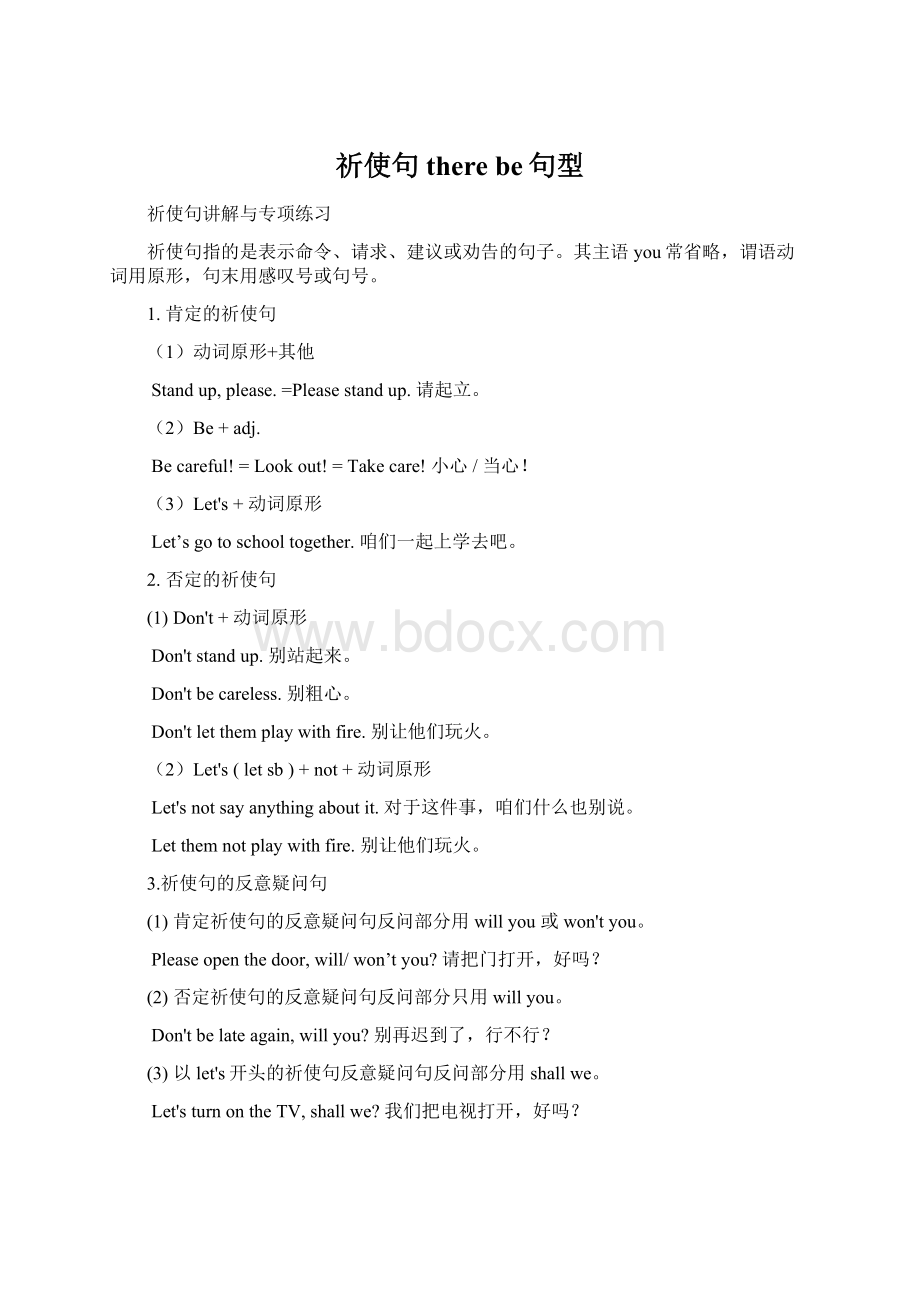祈使句there be句型.docx
《祈使句there be句型.docx》由会员分享,可在线阅读,更多相关《祈使句there be句型.docx(12页珍藏版)》请在冰豆网上搜索。

祈使句therebe句型
祈使句讲解与专项练习
祈使句指的是表示命令、请求、建议或劝告的句子。
其主语you常省略,谓语动词用原形,句末用感叹号或句号。
1.肯定的祈使句
(1)动词原形+其他
Standup,please.=Pleasestandup.请起立。
(2)Be+adj.
Becareful!
=Lookout!
=Takecare!
小心/当心!
(3)Let's+动词原形
Let’sgotoschooltogether.咱们一起上学去吧。
2.否定的祈使句
(1)Don't+动词原形
Don'tstandup.别站起来。
Don'tbecareless.别粗心。
Don'tletthemplaywithfire.别让他们玩火。
(2)Let's(letsb)+not+动词原形
Let'snotsayanythingaboutit.对于这件事,咱们什么也别说。
Letthemnotplaywithfire.别让他们玩火。
3.祈使句的反意疑问句
(1)肯定祈使句的反意疑问句反问部分用willyou或won'tyou。
Pleaseopenthedoor,will/won’tyou?
请把门打开,好吗?
(2)否定祈使句的反意疑问句反问部分只用willyou。
Don'tbelateagain,willyou?
别再迟到了,行不行?
(3)以let's开头的祈使句反意疑问句反问部分用shallwe。
Let'sturnontheTV,shallwe?
我们把电视打开,好吗?
<特别注意>只有以let's开头的祈使句的反意疑问句的反问部分才用shallwe,而letus开头的祈使句的反意疑问句的反问部分应为willyou或won'tyou.如:
Letusstayhere,will/won'tyou?
请(你)让我们留在这好吗?
语法练兵场
单项选择
1.TheTVistooloud.Please________.
A.turnitdownB.toturnitdownC.turndownitD.toturndownit
2._______lateagain,Bill!
A.Don'ttobeB.Don'tbeC.NotbeD.Benot
3._______crosstheroaduntilthetrafficlightsturngreen.
A.NotB.Won'tC.Doesn'tD.Don't
4.Pleasehelpmecarryit,______?
A.willIB.willyouC.shallID.shallwe
5.Don'tmakesomuchnoise,______?
A.willyouB.won'tyouC.shallweD.doyou
6.Doyouknowthegirl______underthetree?
A.standB.tostandC.standingD.stood
7.Kate,_______yourhomeworkheretomorrow.
A.bringB.bringsC.tobringD.bringing
8.________methetruth,orI'llbeangry.
A.TellingB.TotellC.ToldD.Tell
9.I'vekeptthedog_______Maomaoforalongtime.
A.NameB.namedC.namingD.toname
10.Don'tyouknowthat_______isgoodforourhealth?
A.swimB.swimmingC.swamD.swims
句型转换
11.Willyoupleasereaditagainmoreslowly?
(改为祈使句)
__________againmoreslowly,please.
12.Ifyoudon'tlistentome,I'llgo.(改为同义句)
__________me,orI’llgo.
13.Let'swatchthesportsgames.(改为反意疑问句)
Let'swatchthesportsgames,__________?
14.Theteachersoftentellthestudentsnottobecareless.(改为祈使句)
__________careless,please.
15.PleasesitnexttoNancy.(改为否定句)
__________nexttoNancy.
16.Don'tforgettoturnoffthelights,please.(改为反意疑问句)
Don'tforgettoturnoffthelights,__________?
17.Ifyoumove,you'lldie.(改为同义句)
__________,oryou'lldie.
18.Cometomyhousetomorrow.(改为反意疑问句)
Cometomyhousetomorrow,__________?
19.这是一个坏了的被子。
(翻译句子)
Thisisa____________.
20.让我们去帮帮那个哭泣的女孩吧。
(翻译句子)
Let’sgoandhelpthe__________,please.
Therebe句型与have,has的区别
一、Therebe句型
1.表示:
在某地有某物或某人。
2.在therebe句型中,主语是单数或不可数名词,be动词用is;主语是复数,be动词用are;如有几件物品,be动词根据最近be动词的那个名词决定。
Thereisabookonthedesk.Thereissomewaterintheglass.
Therearethreemenunderthetree.Thereisabag,twobooksandthreepensonthedesk.
3.therebe句型的否定句在be动词后加not,一般疑问句把be动词调到句首。
Thereisaduckintheriver.
否定句:
Thereisnotaduckintheriver.
一般疑问句:
Isthereaduckintheriver?
4.some和any在therebe句型中的运用:
some用于肯定句,any用于否定句或疑问句。
1.表示:
某
5.and和or在therebe句型中的运用:
and用于肯定句,or用于否定句或疑问句。
二、have,has
人或某物“拥有”什么东西,强调“所属关系”,而且某人某物作为句子的主语。
2.have用在人称I,we,you,they和复数的人或物后面。
has用在人称he,she,it和单数和人或物后面。
Ihaveadaughter.Hehasaluckydog.
三、Therebe句型与have,has有时也可以通用。
如:
Theclassroomhastendesks.=Therearetendesksintheclassroom.教室里有十张桌子。
注意:
1.“have+表示一日三餐的名词”,意为“用餐”。
如:
havebreakfast吃早餐,havelunch吃午饭,havesupper吃晚饭。
2.“have+表示食品、饮料等名词”,意为“吃;喝”。
如:
have(some)bread吃面包,haveeggs(forbreakfast)(早餐)吃鸡蛋,have(acupof)tea喝(一杯)茶。
3.“have+表示动作的名词”,没有固定的意思,常与表示动作的名词同义。
如:
havearest休息一下
haveaswim游泳
haveadrink(of...)喝一点(……)
havealook(at...)(朝……)看一眼
4.“have+表示某种活动的名词”,意为“进行,举行”。
如:
haveaclass(学生)上课
haveabirthdayparty举行生日聚会
相关练习题
一、用恰当的be动词填空。
1.There alotofsweetsinthebox.
2.There somemilkintheglass.
3.There somepeopleunderthebigtree.
4.There apictureandamaponthewall.
5.There aboxofrubbersnearthebooks.
6.There lotsofflowersinourgardenlastyear.
7.There aplateofchickenbehindthefridgeyesterday.
8.There fourcupsofcoffeeonthetable.
二、用have或has填空。
1.I________anicepicture.
2.He________agoodfriend.
3.They_________somekites.
4.We________someflowers.
5.She__________aduck.
6.Hermother_________avase.
7.Ourteacher_________anEnglishbook.
8.Ourteachers_________abasketball.
9.Theirparents__________somestorybooks.
10.Nancy_______manyskirts.
11.Myfriends________afootball.
12.Whatdoyou________?
13.WhatdoesMike________?
14.Hisbrother_______abasketball.
15.Hersister_______anicedoll.
16.MissLi________anEnglishbook.
三、用“have,has”“thereis,thereare”或者“isthere,arethere”填空。
1.I______agoodfatherandagoodmother.
2.___________abookonthedesk.
3.He________atape-recorder.
4.____________abasketballintheplayground.
5.She________somedresses.
6.They_________anicegarden.
7.Whatdoyou_________?
8._____________areading-roominthebuilding?
9.WhatdoesMike_________?
10._____________anybooksinthebag?
11.Myfather_______astory-book.
12.______________astory-bookonthetable.
13.______________anyflowersinthegarden?
14.Howmanystudents____________intheclassroom?
15.Myparents_________somenicepictures.
16.____________somemapsonthewall.
四、把下列句子改为否定句。
1.Ihaveaping-pongball.
2.Wehaveabasketball.
3.HisaunthasanewTV.
4.Thereisanappleinthebasket.
_____________________________________
5.Therearesomeboysinourclass.
_____________________________________
五、单项选择。
()1._____hehaveapencilcase?
A.DoB.DoesC.IsD.Are
()2.I___afootball,andJiamin_____abasketball.
A.have,haveB.has,hasC.have,hasD.has,have
()3.Doeshehaveacomputer?
No,he______.
A.doesn’tB.don’tC.hasn’tD.haven’t
()4.MrWhite____twochildren.
A.doesn’thaveB.haveC.doesn’thasD.don’thave
()5.DoesTom_____anyerasers?
Yes,he______some.
A.have,haveB.has,hasC.have,hasD.has,have
()6.Manypeople_____computersnow.
A.haveB.hasC.are
()7.They____someoranges.
A.haveB.hasC.arethere
()8._____yougotacard?
A.HaveB.hasC.Arethere
()9._______anyteachersintheoffice?
A.HaveB.hasC.Arethere
()10.Isthereagooseintheriver?
_____________.
A.Yes,heisB.No,thereis.C.Yes,thereis.
Therebe句型与have,has的区别
一、Therebe句型
1.表示:
在某地有某物或某人。
2.在therebe句型中,主语是单数或不可数名词,be动词用is;主语是复数,be动词用are;如有几件物品,be动词根据最近be动词的那个名词决定。
Thereisabookonthedesk.Thereissomewaterintheglass.
Therearethreemenunderthetree.Thereisabag,twobooksandthreepensonthedesk.
3.therebe句型的否定句在be动词后加not,一般疑问句把be动词调到句首。
Thereisaduckintheriver.
否定句:
Thereisnotaduckintheriver.
一般疑问句:
Isthereaduckintheriver?
4.some和any在therebe句型中的运用:
some用于肯定句,any用于否定句或疑问句。
5.and和or在therebe句型中的运用:
and用于肯定句,or用于否定句或疑问句。
6.针对数量提问的特殊疑问句的基本结构是:
Howmany+ 名词复数+arethere+介词短语?
Howmuch+不可数名词+isthere+介词短语?
7.针对主语提问的特殊疑问句的基本结构是:
What’s+介词短语?
二、have,has
1.表示:
某人或某物“拥有”什么东西,强调“所属关系”,而且某人某物作为句子的主语。
2.have用在人称I,we,you,they和复数的人或物后面。
has用在人称he,she,it和单数和人或物后面。
Ihaveadaughter.Hehasaluckydog.
三、Therebe句型与have,has有时也可以通用。
如:
Theclassroomhastendesks.=Therearetendesksintheclassroom.教室里有十张桌子。
注意:
1.“have+表示一日三餐的名词”,意为“用餐”。
如:
havebreakfast吃早餐,havelunch吃午饭,havesupper吃晚饭。
2.“have+表示食品、饮料等名词”,意为“吃;喝”。
如:
have(some)bread吃面包,haveeggs(forbreakfast)(早餐)吃鸡蛋,have(acupof)tea喝(一杯)茶。
3.“have+表示动作的名词”,没有固定的意思,常与表示动作的名词同义。
如:
havearest休息一下
haveaswim游泳
haveadrink(of...)喝一点(……)
havealook(at...)(朝……)看一眼
4.“have+表示某种活动的名词”,意为“进行,举行”。
如:
haveaclass(学生)上课
haveabirthdayparty举行生日聚会
相关练习题
一、用恰当的be动词填空。
1.There alotofsweetsinthebox.
2.There somemilkintheglass.
3.There somepeopleunderthebigtree.
4.There apictureandamaponthewall.
5.There aboxofrubbersnearthebooks.
6.There lotsofflowersinourgardenlastyear.
7.There aplateofchickenbehindthefridgeyesterday.
8.There fourcupsofcoffeeonthetable.
二、用have或has填空。
1.I________anicepicture.
2.He________agoodfriend.
3.They_________somekites.
4.We________someflowers.
5.She__________aduck.
6.Myfather__________anewbike.
7.Ourteacher_________anEnglishbook.
8.Theirparents__________somestorybooks.
9.David________somejackets.
10.Myfriends________afootball.
11.WhatdoesMike________?
12.Whatdoyourfriends_________?
13.Hisbrother_______abasketball.
14.MissLi________anEnglishbook.
三、用“have,has”“thereis,thereare”或者“isthere,arethere”填空。
1.I______agoodfatherandagoodmother.
2.___________abookonthedesk.
3.He________atape-recorder.
4.____________abasketballintheplayground.
5.She________somedresses.
6.They_________anicegarden.
7.Whatdoyou_________?
8._____________areading-roominthebuilding?
9.WhatdoesMike_________?
10._____________anybooksinthebag?
11.Myfather_______astory-book.
12.______________astory-bookonthetable.
13.______________anyflowersinthegarden?
14.Howmanystudents____________intheclassroom?
15.Myparents_________somenicepictures.
16.____________somemapsonthewall.
17._____________amapoftheworldonthewall.
18.David________acar.
19.David’sfriends___________s